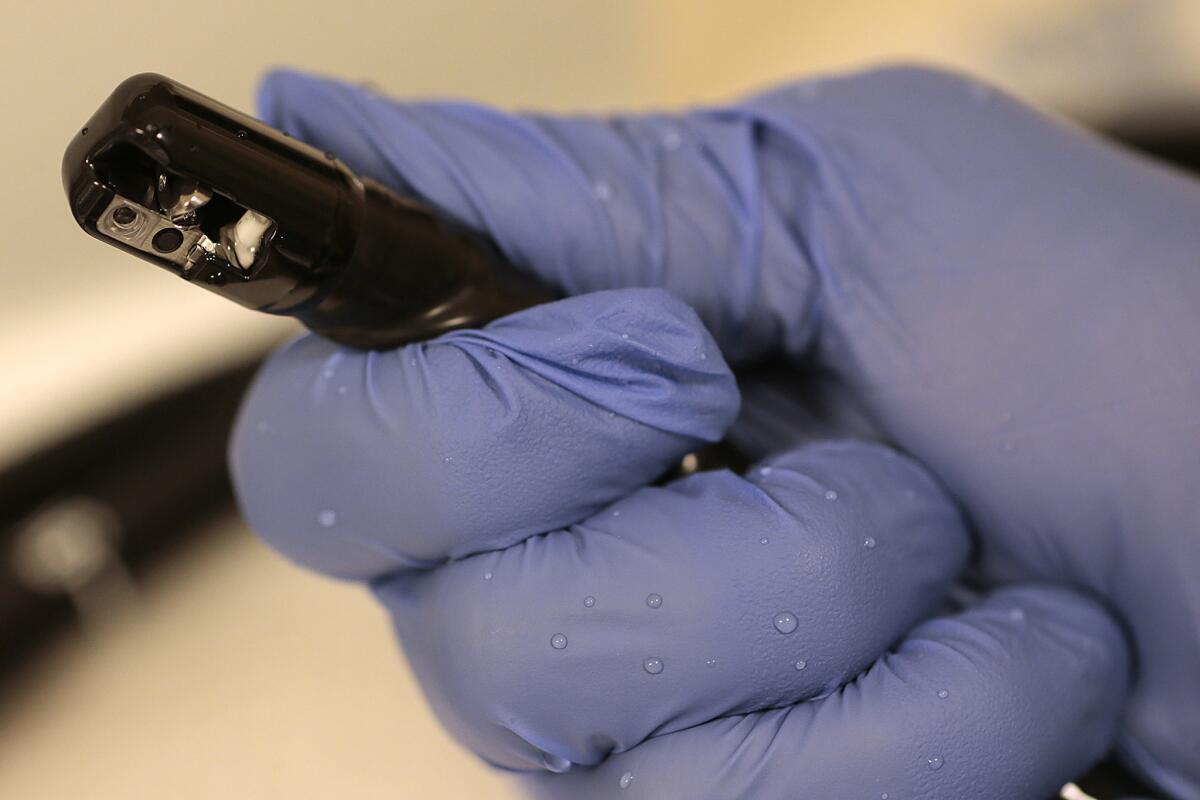Olympus Corp. to pay $646 million to settle kickback charges

An Olympus duodenoscope is cleaned at Los Angeles County/USC Medical Center on Nov. 9, 2015.
After Olympus Corp. paid to fly three doctors from a prominent California hospital to Japan for a weeklong vacation, one of the physicians thanked the company for providing them with “so much extra entertainment that we did not expect.”
The expense-paid trip was just one of the dozens of illegal kickbacks that the Japanese maker of endoscopes paid to American doctors and hospitals for at least five years as it sought to increase sales in its most lucrative market, according to a criminal complaint federal prosecutors released Tuesday.
Prosecutors said that Olympus had agreed to pay $623.2 million to settle criminal and civil charges — the largest amount ever paid by a medical device company for violations of anti-kickback laws.
The former Olympus employee who brought the case to prosecutors will receive $51.1 million of that amount.
Prosecutors are continuing an investigation related to a recent series of deadly outbreaks — including one at UCLA Medical Center — that have been linked to an Olympus scope.
Among the company’s illegal payments and gifts was $400,000 worth of endoscopes given to a doctor for use in his private practice after he convinced a New York hospital to buy millions of dollars’ worth of Olympus equipment.
At one Olympus-sponsored forum, the company paid for doctors’ lavish meals, ballooning, winery tours, golf and spa treatments because it was “a great way to network, talk business, socialize without our competitors,” an Olympus employee had explained, according to the complaint.
Prosecutors did not name the doctors and hospitals that Olympus paid from 2006 to 2011.
Among Olympus’ products is a $40,000 medical device known as a duodenoscope that has been tied to superbug outbreaks across the country.
Olympus was told by an independent expert in June 2012 that the design of that device made it almost impossible to clean. The company did not warn American hospitals about the problem until after the UCLA outbreak almost three years later.
In January, a U.S. Senate investigation said that failures by Olympus, federal regulators and hospitals had allowed the deadly outbreaks to continue long after the device’s dangerous design was discovered.
The Senate investigators pointed out that not one of the 16 or more American hospitals where patients were sickened appeared to have properly reported the outbreaks.
On Tuesday, Olympus acknowledged the “past conduct” outlined in Tuesday’s complaint. The company said it had implemented a “robust compliance program.”
“Olympus is committed to complying with all laws and regulations, and to adhering to our own rigorous code of conduct,” said Nacho Abia, chief executive of Olympus Corp. of the Americas.
The case comes from a lawsuit filed by John Slowik, the former chief compliance officer at Olympus Corp. of the Americas, which is based in Center Valley, Pa. Slowik filed the suit under the federal False Claims Act, which allows whistle-blowers to get a portion of settlements when companies are found to have defrauded taxpayers.
In a separate criminal case, Olympus also agreed Tuesday to pay $22.8 million to resolve charges it had given bribes to doctors and other health officials in Central and South America.
In the U.S. case, prosecutors said Olympus senior executives had “knowingly and intentionally conspired” to give cash and other kickbacks to doctors and hospitals to get them to buy its scopes.
Olympus used the kickbacks to bring in $600 million in sales of endoscopes and other medical equipment, earning it more than $230 million in gross profits, the complaint said.
The company created an internal committee, composed mostly of sales and marketing executives, which gave financial grants to doctors and hospitals to get them to buy Olympus scopes, prosecutors said.
For example, according to the criminal complaint, an Olympus sales vice president who sat on the committee asked the company to give a $100,000 grant to a hospital’s foundation because it was “our #1 account in the U.S. and I have no intention of losing any of it to” a competitor.
The company gave a large Midwestern hospital the free use of equipment worth more than $1 million to keep it as a customer, prosecutors said.
And every year from 2006 through 2009, Olympus treated the physician who served as president of a prominent professional organization and his or her spouse to a weeklong trip to Japan, also paying the doctor $10,000 to give a lecture during the trip.
The kickbacks included consulting payments to physicians, including one doctor who was paid $112,300 between 2006 and 2011. The company believed the doctor could influence purchasing decisions at a leading hospital in the Southeast, prosecutors said.
Prosecutors said Olympus agreed that the facts in the complaint were true.
Under Tuesday’s settlement, Olympus agreed to enter into a three-year deferred prosecution agreement that will allow it to avoid conviction if it complies with the reforms that prosecutors demanded, including future financial penalties for executives who engage in misconduct.
Scott J. Lampert, one of the federal investigators, said the company’s “greed-fueled kickback scheme” had “threatened the impartiality of medical decision-making.”
melody.petersen@latimes.com






